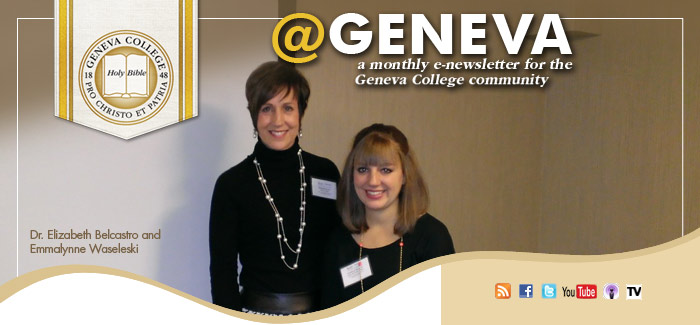Inclusion in the Classroom
Geneva graduate student Emmalynne Waseleski and education professor Dr. Elizabeth Belcastro recently presented at the Pennsylvania Council for Exceptional Children (PACEC) Conference. Their presentation, “Marching to the Beat of Our Own Drum,” centered on strategies for including students with disabilities.
Waseleski is currently a choral director at Butler Area Junior High School and studying for her master′s in special education. “As a choir director, I teach all-inclusion classes with a wide range of ability levels within my classroom,” she said. “I have always been extremely passionate about the ability for music to be the tool I use to teach all children, regardless of their label or disability.”
She added, “I believe a choral classroom is one of the few venues in which a student can truly blend in with the other students. I also believe music is a source of enjoyment and pleasure that students can take with them long after they leave my class—it truly improves their quality of life.”
Because of the excellence of Waseleski′s efforts in classroom inclusion, Belcastro suggested that she pursue a larger research project with an academic article and conference presentation. “One of the graduate courses I teach is about learning how to implement academic strategies in inclusion classrooms,” said Belcastro. “During the time Emmalynne was a graduate student in this course, I was intrigued with the various ways she was teaching essential components of effective teaching geared toward students with special needs in her music classes.”
Belcastro and Waseleski chose the title “Marching to the Beat of Our Own Drum” to emphasize God′s unique creation of each person. The presentation addressed a wide range of disabilities, including: emotional behavior disorder, Autism spectrum disorder, Asperger syndrome, ADD/ADHD, hearing impairment, visual impairment, intellectual disability and speech disorders.
“One of the examples I included in the presentation was a warm-up that teaches my students the homophones ‘there, they′re, and their.′ These three words are a constant struggle for students in junior high, but once they learn to sing the words along with their definitions, they have a mnemonic device that is simple to retrieve from memory,” said Waseleski.
The presentation demonstrated successful inclusive classroom techniques and the effects they have on students, providing viewers a valuable learning experience.
“I really enjoy having the opportunity to witness the many talents and skills students bring to my classes at Geneva and helping them use these talents in the field,” said Belcastro. “This brings to mind 2 Timothy 2:2 which states, ‘And what you have heard from me in the presences of many witnesses entrust to faithful men who will be able to teach others also.′"
-Jessica Driscoll ′14
|



